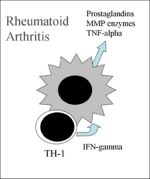Difference between revisions of "Rheumatoid Arthritis"
JamesSwann (talk | contribs) |
|||
| (2 intermediate revisions by the same user not shown) | |||
| Line 2: | Line 2: | ||
'''Pathogenesis:''' | '''Pathogenesis:''' | ||
| − | * [[Type IV Hypersensitivity | + | * [[Type IV Hypersensitivity|Type IV hypersensitivity]]: CD4 Th-1 cell mediated. |
* Macrophages phagocytose self antigens and can present peptides on their MHC Class II molecules. The autoreactive TH-1 cells release IFN-gamma which activates macrophages to release prostaglandins, MMP enzymes and TNF-alpha (pro-inflammatory mediator), see diagram. These cytokines cause inflammation and tissue destruction. | * Macrophages phagocytose self antigens and can present peptides on their MHC Class II molecules. The autoreactive TH-1 cells release IFN-gamma which activates macrophages to release prostaglandins, MMP enzymes and TNF-alpha (pro-inflammatory mediator), see diagram. These cytokines cause inflammation and tissue destruction. | ||
| − | [[Category:Cell Mediated Autoimmune Diseases]][[Category:To Do - | + | |
| + | |||
| + | *Occurs in the dog, mainly smaller breeds | ||
| + | *Uncommon | ||
| + | *Progressive erosive polyarthritis | ||
| + | *Mostly involves elbows, stifles, carpal and tarsal joints | ||
| + | *Grossly: | ||
| + | **Marked villus hypertrophy of synovial membrane | ||
| + | **Cartilage erosion | ||
| + | **[[Musculoskeletal Terminology - Pathology|Pannus and periarticular osteophyte]] formation | ||
| + | **In severe cases ankylosis | ||
| + | *Histologically: | ||
| + | **Hyperplasia of lining cells | ||
| + | **Proliferative synovitis | ||
| + | **Synovial membrane has fibrin deposits | ||
| + | **Lymphoid and plasma cell infiltration | ||
| + | **Surrounding haemorrhagic areas | ||
| + | **Macrophages containing [[Pigmentation - Pathology#Haemosiderin|haemosiderin]] | ||
| + | **Connective tissue may contain foci of necrosis | ||
| + | **Areas of erosion of peripheral articular cartilage and underlying subchondral bone | ||
| + | *Pathogenesis: | ||
| + | **May involve deposition of immune complexes within joints | ||
| + | **Substances degrading cartilage are released by synovial cells and macrophages involved in pannus formation | ||
| + | |||
| + | |||
| + | |||
| + | |||
| + | |||
| + | [[Category:Cell Mediated Autoimmune Diseases]][[Category:To Do - Clinical]][[Category:To Do - Blood]] | ||
Latest revision as of 16:19, 3 March 2011
Pathogenesis:
- Type IV hypersensitivity: CD4 Th-1 cell mediated.
- Macrophages phagocytose self antigens and can present peptides on their MHC Class II molecules. The autoreactive TH-1 cells release IFN-gamma which activates macrophages to release prostaglandins, MMP enzymes and TNF-alpha (pro-inflammatory mediator), see diagram. These cytokines cause inflammation and tissue destruction.
- Occurs in the dog, mainly smaller breeds
- Uncommon
- Progressive erosive polyarthritis
- Mostly involves elbows, stifles, carpal and tarsal joints
- Grossly:
- Marked villus hypertrophy of synovial membrane
- Cartilage erosion
- Pannus and periarticular osteophyte formation
- In severe cases ankylosis
- Histologically:
- Hyperplasia of lining cells
- Proliferative synovitis
- Synovial membrane has fibrin deposits
- Lymphoid and plasma cell infiltration
- Surrounding haemorrhagic areas
- Macrophages containing haemosiderin
- Connective tissue may contain foci of necrosis
- Areas of erosion of peripheral articular cartilage and underlying subchondral bone
- Pathogenesis:
- May involve deposition of immune complexes within joints
- Substances degrading cartilage are released by synovial cells and macrophages involved in pannus formation
